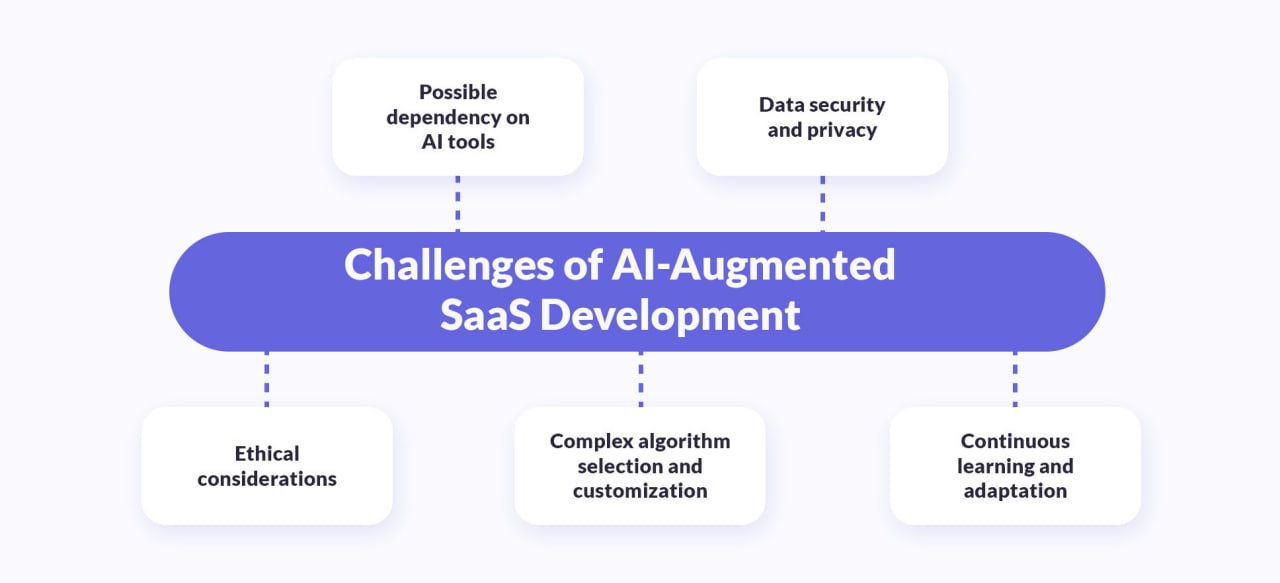The integration of
AI and SaaS
is a topic of increasing relevance and complexity. Artificial Intelligence is undoubtedly shaping the future of technology, but its integration into Software as a Service platforms presents unique challenges and considerations. This article aims to delve into these challenges, providing insights for businesses and developers navigating this dynamic field.

One of the primary concerns in leveraging AI within SaaS is the possible over-reliance on AI tools. While AI can significantly enhance functionality and efficiency, it's crucial to remember that AI results are only as reliable as the data fed into them. Overdependence on AI can lead to vulnerabilities, especially if technology fails or service disruptions occur. Therefore, it's essential to have well-trained staff, contingency plans, and a balanced approach to the use of AI in SaaS platforms.
Data breaches are a growing concern in the digital world, and any SaaS platform integrating AI must prioritize data security and privacy. The AI systems, capable of processing vast amounts of data, including sensitive customer information, must be designed with robust security measures to prevent unauthorized access and data leaks.
The ethical implications of AI integration into SaaS are multifaceted. There are concerns about human redundancy in the face of automated processes, fears of AI becoming uncontrollably powerful, and debates over the ethical use of AI in various applications. Addressing these concerns requires careful consideration, ethical guidelines, and safeguards to ensure AI is used responsibly and beneficially.
AI's ability to perform complex tasks is still evolving. While it excels at simple, repetitive tasks and data processing, AI systems often struggle with complex algorithm selection and deep learning tasks. This limitation poses a challenge in customizing SaaS solutions to meet specific, nuanced business needs.
The integration of AI in SaaS demands a shift in human roles towards more supervisory and strategic positions. Humans need to adapt and learn continuously to harness the full potential of AI tools effectively. This ongoing learning process is challenging but essential for businesses to remain competitive and innovative.
Avoid over-reliance on AI by maintaining a balance between automated and human-driven processes. This approach ensures that in case of AI failures, your SaaS platform remains functional and reliable.
Implementing advanced cybersecurity measures and adhering to privacy regulations is non-negotiable. Regular audits and updates to security protocols can help safeguard sensitive data processed by AI systems.
Developing a clear ethical framework for AI usage and staying informed about the latest discussions in AI ethics can guide responsible and beneficial AI integration.
Investing in skilled professionals who can fine-tune AI algorithms to suit specific SaaS requirements can overcome the challenge of complex customizations.
Encouraging a culture of continuous learning and adaptation within your team can facilitate a smoother integration of AI in SaaS development.
Integrating AI in SaaS development is a journey full of challenges, but it also offers immense potential for driving business growth and innovation. While AI can accelerate development processes and enhance SaaS functionalities, it requires careful management, ethical considerations, and a commitment to continuous learning and adaptation.
For businesses not equipped to handle these challenges internally, partnering with a reputable company specializing in AI and SaaS can be a viable and effective solution. As we navigate this complex terrain, it’s crucial to strike a balance between leveraging AI's capabilities and maintaining human oversight and ethical responsibility.